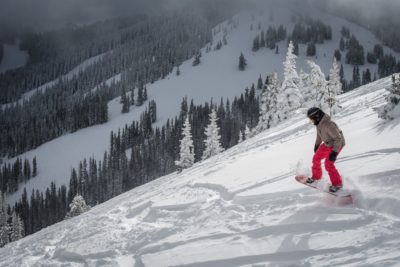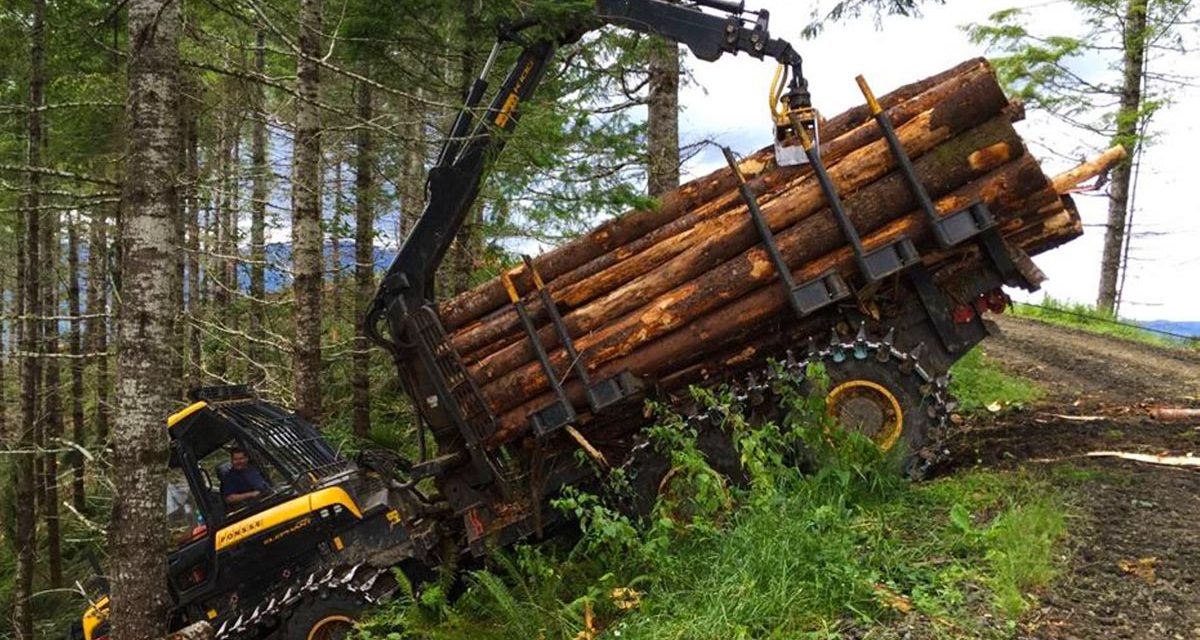The Butterfly Effect: The phenomenon whereby a minute localized change in a complex system can have large effects elsewhere.
Climate change is all around us. We can see it in the temperature, frequent forest fires, rising sea levels, droughts, and — in our local snowpack.
Monarch Mountain Ski Resort is an essential part of Salida and what effects Monarch will eventually affect Salida. This has been observed in other places too. For example, the soil on Aspen Ridge is expected to become too arid to even support aspen. So how would this affect Monarch?
When soil becomes too arid it affects its ability to retain snow. Without moisture in the soil, the snow will melt into it and if there is any left, it will be poor quality.
Ski resorts rely on having quality snow, it is the basis of their operations. Another risk of having arid soil is the impact on water resources. When the soil lacks moisture, it will absorb into the earth once the snow comes. This could create water scarcity issues for plants, animals, and humans.
Another aspect of the climate crisis is rising temperatures. When you are driving to Monarch and beyond, you see piles of dead trees set up strategically. These piles are there as a result of invasive tree parasites. Tree parasites lay their eggs in the bark of the trees. The way that these larvae are killed is when there are two weeks of temperatures below zero. This is becoming a precarious balance. We aren’t getting two consecutive weeks below zero during winter anymore and the beetles are targeting big trees.
Big trees are essential in making sure the forest can be rebuilt after a forest fire. Big trees have thicker bark which makes them tougher fuel for fire. They also regulate the moisture in the ground and through their roots, they can help prevent the spread of the fire. Last, but most importantly, large trees have seed banks underneath them and those seeds can have fire-adaptive traits that play an essential role in rebuilding a forest in the event of a forest fire.

Ark Valley Voice intern Eliot J. Miller notes a positive response when interviewing Chris Naccarato, District/Zone Fire Mgmt. Off., Region 2, Rocky Mountain Region. Merrell Bergin photo
When beetles kill the large trees and the seeds underneath them, they are halfway through the process of destroying an ecosystem. If a fire starts, it will change the entire ecosystem. In an interview with U.S. Forest Service District/Zone Fire Management Officer Chris Naccarato he said, “Fire hits the reset button in a forest and when all of the trees are vulnerable, the fire is going to go until it runs out of fuel.”
Tourism keeps our community alive. People come to Salida for its mountains, skiing, river, and our small-town charm. What we have learned is that when Monarch takes a hit, so does our local economy.
A concern is that when and if it gets too hot to support a ski resort — will Salida’s economy take a toll? Ski resorts capture a huge percent of Salida’s local economy. Monarch provides jobs, seasonal visitors, second homeowners, and business for all of the other establishments in town. Monarch Mountain employs around 375 people- this includes cafeteria workers, ski patrol, trail groomers, and desk workers.
This means that Monarch accounts for about 6.5 percent of the community’s jobs. On that note, it keeps a lot of other businesses in business. They bring a lifesaving flow of tourism in the winter that keeps many people in their jobs. When tourists come to town in the winter they eat out, buy at shops, rent our houses, and go to Monarch. This brings so much money to the economy.
Climate change makes the ski resort industry nervous
Despite repeated efforts to get a response from industry spokespersons, Ark Valley Voice was challenged to put this story together. Clearly, climate change and conditions on the mountain affect a resorts bottom line – especially those who do not have artificial snowmaking. While a unique marketing advantage for Monarch Mountain, it leaves them even more at the whims of Mother Nature.
The initial focus of this article was aimed at the obvious choice: local favorite, Monarch Mountain. However, Monarch turned down requests to interview both Randy Stroud, General Manager and Scott Pressly, VP of Mountain Operation so AVV shifted and got an interview with a much different ski operation with major resources behind it.
Aspen Snowmass and The Environment Foundation
Aspen is a ski resort in Colorado that says it is proud of the measures they have taken towards the climate crisis. The Environment Foundation – a collaboration with Aspen Community Foundation and the Aspen Skiing Company Family Fund, with added support from Lavazza — is a nonprofit employee organization dedicated to protecting and preserving the regional environment. Sustainability is a key initiative and they publish an annual report on their work.

Auden Schendler, SVP Sustainability at Aspen Ski Company. Courtesy photo
In an interview with Senior Vice President of Sustainability Auden Schendler at Aspen Skiing Company, he outlined the effects climate change is having on their resort and what they’re doing to try to slow it down. Schendler is also on the board of Protect Our Winters, a nonprofit whose mission is “to engage the snow sports community in the fight against climate change.”
He was asked the following questions:
Have you noticed any shifts in visitor behavior or preferences as a result of climate-related changes in snow conditions?
Schendler explained that short-term bookings are becoming more and more frequent. He also said that this might be caused by more erratic weather or it could also be wealth and ease of travel. Aspen also says they have noticed, “Extreme March warm-ups like we’ve seen increasingly.”
What strategies has your resort implemented to mitigate the impacts of climate change on operation and guest experience?
Aspen has been developing higher-elevation terrain, improving snowmaking capacity and efficiency, and brushing slopes in summer so they can open with less snow. So snowmaking is a big part of dealing with climate change there and Monarch doesn’t make their own snow. This begs the question, how long can Monarch survive without making its own snow? Aspen also says, “Climate [change] is a long-term threat. As long as we keep emitting CO2 emissions, it’s going to be a concern. Coastal and low elevation resorts will see the effects first.”
Are there any specific environmental initiatives or sustainability measures that your resort has undertaken in response to climate change?
Most businesses will answer this question by telling you they are reducing their carbon footprint and reducing their impact. “Few reporters follow up with the question: ‘Will that solve climate change?’ The answer is no. We think the things you need to do to deal with climate change involve wielding power, creating social movements, getting activists and politically involved.”

Monarch Mountain (Photo Courtesy of Powder Alliance)
What plans do you have for when the warming temperatures and changing weather patterns begin to be too much?
“Resorts, ours included, are already diversifying geographically (so that if Colorado, say, has a bad year, maybe California doesn’t.) Diversifying business (i.e.., hotels or summer operations or more snowmaking) into things that are not climate affected.”
How has climate change affected the overall conditions of [Aspen] resort?
“I think the most obvious impact has been forest health: tree death from drought and from pine and spruce beetles.”
This brings us back around full circle to what was noted earlier with the bark beetles. It’s real-life proof that this is happening here and in other places as well.
The “Butterfly Effect” is now; how will we deal with it?
Featured image: This steep-slope cut-to-length equipment uses tracks and a winch to perform logging operations on slopes as steep as 70 percent. The U.S. Forest service used this equipment for the first time in Colorado to harvest beetle-kill timber that would otherwise contribute to heightened risk of forest fire in the Monarch Pass area (courtesy photo).
Editor’s note: This news feature about our changing climate was developed and written by Ark Valley Voice intern Eliot Miller as an intern assignment. She pitched the news story to Managing Editor Jan Wondra, interviewed her sources, sourced her facts, and developed her news story while a student at The Crest Academy. AVV staff Jan Wondra, Merrell Bergin, and Susan Roebuck provided limited guidance on this challenging piece of her original reporting. While her feature was originally intended to focus on local ski resort Monarch Mountain’s adjustments to our climate changes, Monarch Mountain chose not to accept requests to be interviewed. This required a change in focus, which can happen in journalism. It became a learning experience for Miller as we guided the adjustments she made to her climate change feature.








Wow! I was dumfounded to see that the above article was written by an 8th-grader! I’ve written for the automotive trade press for 32 years and won a few publishing and industry service awards in the process. If I could have written that well in the 8th grade, I might have instead won the Nobel Prize for literature…
Gary E. Goms,
Buena Vista, CO
Excellent writing and interview Eliot – you appear to have a great future ahead in journalism.